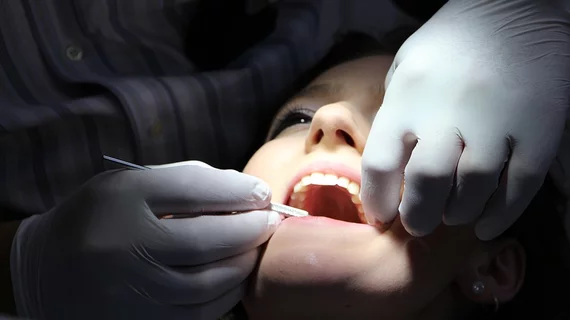CT overused in patients with dental infections
Nearly half of CT scans ordered for patients presenting with dental infections are unnecessary, according to work published in the Journal of Oral and Maxillofacial Surgery, exposing patients to excess costs and physical risk where a more low-impact exam would have been sufficient.
Odontogenic infection is one of the most common diseases in the oral and maxillofacial region, and it’s also common to use CT as a tool to diagnose such infections, first author Ashleigh Weyh, DMD, MPH, and colleagues from the University of Florida Health-Jacksonville wrote in the journal. But CT opens patients to ionizing radiation, pushing their risk of developing cancer down the line.
“The radiation dose from one scan is associated with a lifetime risk of death of cancer of approximately 1 per 2,000 CT scans,” Weyh et al. wrote. “However, the dose associated with three or four scans is approximately equivalent to that of atomic bomb survivors who were 1 to 2 miles from ground zero.”
In an effort to quantify CT overuse in a dental setting, the authors undertook a study of 470 adults with odontogenic infections who were treated in their emergency department. They considered a scan unnecessary if the patient didn’t present with a “red-flag sign” like voice change, swelling around the eyes, labored breathing, trismus or difficulty swallowing. In those cases, physical exams, patient history and panoramic imaging should sufficient for a diagnosis.
A total of 389 CTs were performed in the study population, 56.6 percent of which Weyh and colleagues deemed unnecessary. Unnecessary scans were most common in patients with low-risk infections, who saw 78.2 percent prevalence of unnecessary exams.
“The authors’ hypothesis was based on overuse estimates for other diagnoses, and they underestimated overuse for odontogenic infections,” the researchers wrote. “The high overuse of CT for odontogenic infections is likely related to the drastic variability in odontogenic infection severity and progression, the multitude of complications associated with these infections, their ability to quickly become fatal and the variance in provider experience when managing odontogenic infections.”
The authors said there was also a strong correlation between red-flag signs and moderate- to high-risk infections. Such infections were found in all patients who presented with voice change, 88 percent of patients with elevated floor of the mouth, 75 percent of patients with dysphagia or odynophagia and 68 percent of patients with trismus.
The study could have implications for healthcare economics, Weyh et al. said, since the team’s finding that 56.6 percent of CTs performed in patients with dental infections were unnecessary indicates a major opportunity to cut costs. In Jacksonville, where the study was conducted, a CT scan costs between $1,219 and $3,328 depending on a patient’s insurance—a figure that stands in stark contrast to the $135 it costs to conduct panoramic imaging.
Guidelines could help regulate CT use and promote cost-effectiveness in these scenarios, the authors said, but they don’t currently exist.
“Establishing guidelines to standardize ordering is the first step oral and maxillofacial surgeons can take to decrease unnecessary CT scans,” they wrote. “Guidelines, in theory, would decrease the amount of unnecessary CT scans ordered and standardize ordering practices among providers.”

